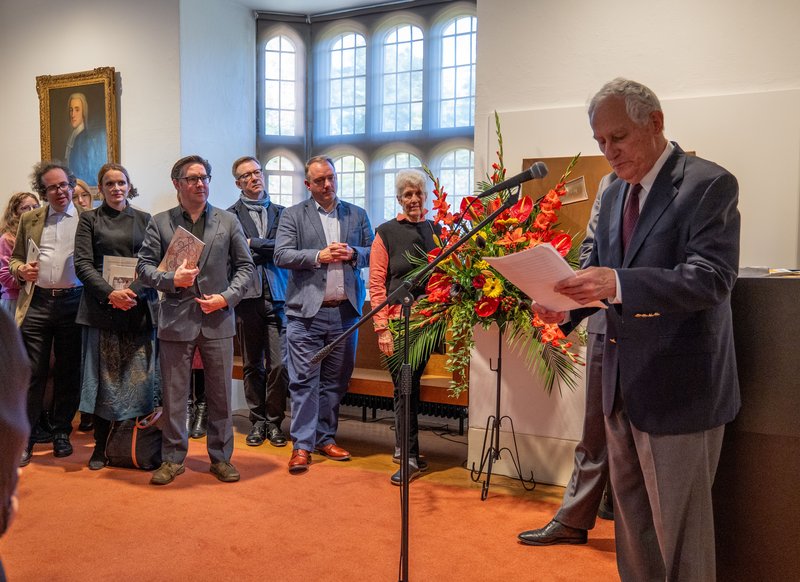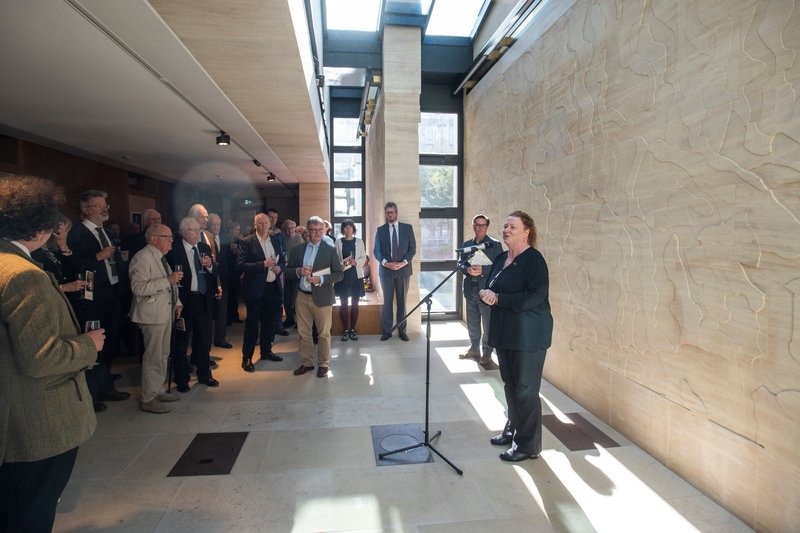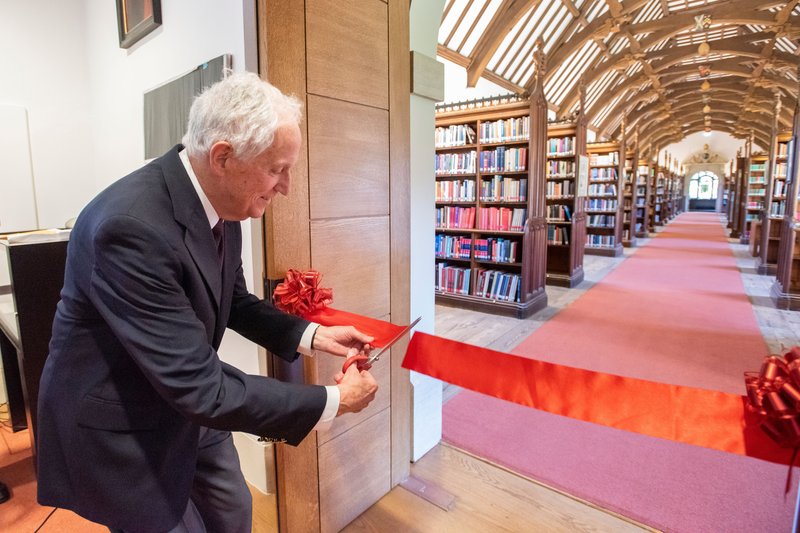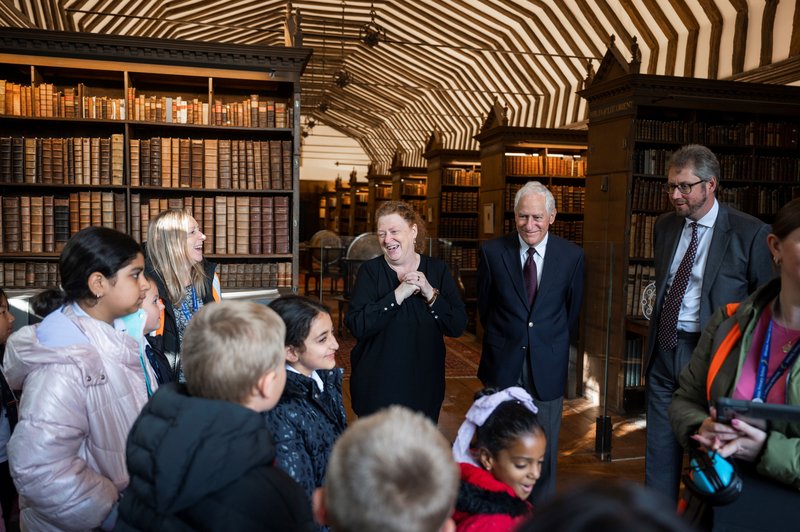Official Opening of the Historic Libraries and Canterbury Quadrangle
On Thursday 3 October 2024, St John’s welcomed alumnus and Honorary Fellow, Professor Robert Darnton FBA, for a special lecture in the auditorium. Professor Darnton’s lecture, ‘Libraries as Time Machines’, celebrated the reopening of the College’s Historic Libraries and Canterbury Quadrangle after a lengthy project of essential restoration and environmental upgrades. The official reopening of the Historic Libraries and the Canterbury Quadrangle took place the following afternoon, Friday 4 October, with Professor Darnton cutting the ribbon to the Laudian Library.

Libraries as Time Machines
Over 130 attendees gathered in the Garden Quad auditorium for Professor Darnton’s lecture. The diversity of this audience – which included librarians, historians, modern linguists, classicists, and bibliographers from across the University, as well as many members of the public – reflected the breadth of Professor Darnton’s research interests and the interdisciplinary significance of his work.
‘Libraries as Time Machines’ was a passionate evocation of the power of libraries throughout time. Professor Darnton began by recalling his first visit to the Houghton Library (Harvard’s library for rare books and manuscripts) as a freshman in 1957, where he read Ralph Waldo Emerson’s Essays (1847), annotated by Herman Melville. The formative experience of reading Emerson through Melville’s eyes shaped Professor Darnton’s interest in ‘analytical bibliography’: the effort to reconstruct the history of reading through close examination of material texts. He spoke eloquently of the almost spiritual experience of reading in historic libraries, and of the profound sense of communion with past readers when consulting special collections and archival materials.
In the second part of his lecture, Professor Darnton offered a brief history of the utopian (or maybe dystopian) dream of a universal library. From the ancient library of Alexandria to the Digital Public Library of America, he explored the allure as well as the inherent dangers of codifying and collecting all available knowledge into a single repository. What would it mean, Professor Darnton asked, to realise this previously impossible dream, and could it possibly be attained within our lifetimes?
Professor Darnton’s lecture was followed by a series of stimulating questions from the audience. These ranged widely, from the challenges of preserving texts and other materials published digitally, to the critical role of authors in creating a universal library. Other questions touched on the problems facing public libraries, as well as what, if anything, is lost when studying special collections via a digital interface.
Professor Darnton's lecture is available to watch via YouTube.
Official Opening
The Official Opening of the Historic Libraries and Canterbury Quadrangle took place the following afternoon. Attendees gathered in the foyer of the new Library and Study Centre (opened in 2019) for a drinks reception and welcome remarks by Professor Lady Sue Black LT DBE, President of St John's. Professor William Whyte, Keeper of Historic Buildings, then reflected on the history of the College’s Historic Libraries and recalled the pomp and ceremony with which Archbishop Laud celebrated the opening of his eponymous Quadrangle in the 1630s. On behalf of the College, Professor Whyte also thanked everyone involved in the remarkable refurbishment project, including the architects of Wright & Wright, Beard Construction, and a wide range of conservators and specialist craftspeople.

Attendees then reassembled at the entrance to the Laudian Library, where special guest Professor Robert Darnton delivered a short address and officially reopened the libraries. Professor Patrick Hayes, Fellow for Libraries, also unveiled a commemorative plaque. Following the ribbon-cutting ceremony, guests had the opportunity to explore the beautifully conserved libraries and to discover the exhibition curated by Dr Petra Hofmann, College Librarian. This important exhibition, which runs until 13 December, highlights the surprising diversity of the College’s special collections.

Visitors were also invited to tour the five restored teaching rooms beneath the Old Library. These rooms had been converted into additional library space in the 1970s. However, with the opening of the new Library and Study Centre, the Paddy Room (as the converted rooms were known) could be reinstated as teaching rooms for Fellows. With the generous support of the alumni community, each of the five refurbished rooms is named after a distinguished College tutor who made a significant impact in their fields and on their students: Professor Elizabeth Fallaize (Modern Languages – French), Professor George Fleet (Organic Chemistry), Professor Mark Freedland KC FBA (Jurisprudence), Professor Sir John Kay FRSE FBA (Economics), and Professor Donald Russell FBA (Classics).
The Official Opening of the Historic Libraries and Canterbury Quadrangle ran in tandem with the launch of an exciting literacy initiative at St John’s. On Friday morning, the College Access Team welcomed Year 5 and 6 pupils from a local primary school for a series of literacy-themed workshops. These workshops encouraged pupils to read, write, perform, and think imaginatively about literature. Pupils were also invited to write or illustrate a short story inspired by Sir Thomas White’s ‘Armada’ chest, with the President and Professor Darnton awarding prizes for the most creative entries. A full report on the Primary Literacy Day is available here.

This Access initiative was a wonderful addition to the programme of events celebrating the reopening of the College’s Historic Libraries and the Canterbury Quadrangle. From its inception, the project of restoration and renewal at St John’s aimed to ensure that all members of College, as well as visitors from the wider academy and the local community, could enjoy excellent resources and welcoming educational spaces for generations to come. It was heartening to see the College’s far-sighted ambitions already being met.